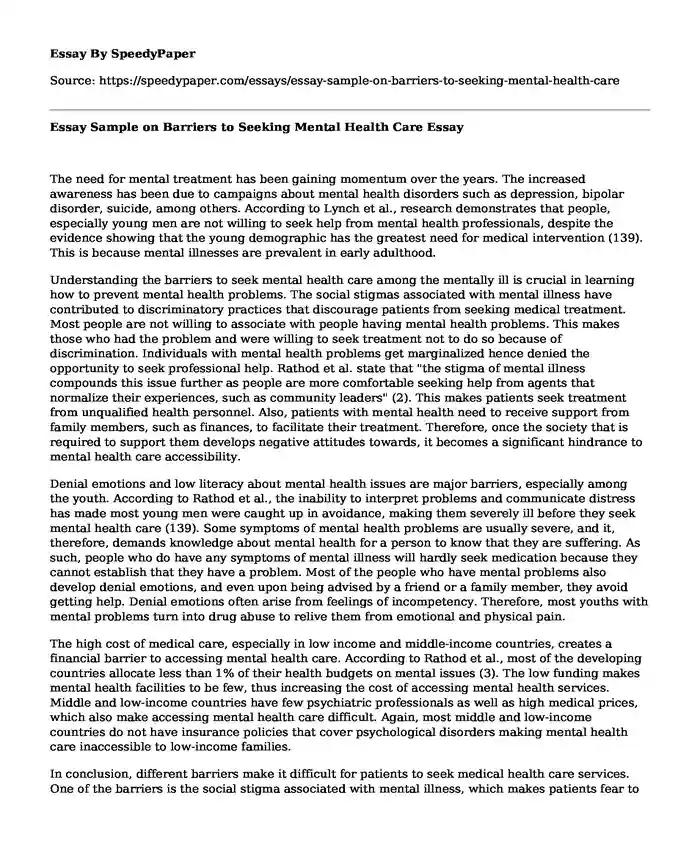
| Type of paper: | Essay |
| Categories: | Mental health |
| Pages: | 3 |
| Wordcount: | 709 words |
The need for mental treatment has been gaining momentum over the years. The increased awareness has been due to campaigns about mental health disorders such as depression, bipolar disorder, suicide, among others. According to Lynch et al., research demonstrates that people, especially young men are not willing to seek help from mental health professionals, despite the evidence showing that the young demographic has the greatest need for medical intervention (139). This is because mental illnesses are prevalent in early adulthood.
Understanding the barriers to seek mental health care among the mentally ill is crucial in learning how to prevent mental health problems. The social stigmas associated with mental illness have contributed to discriminatory practices that discourage patients from seeking medical treatment. Most people are not willing to associate with people having mental health problems. This makes those who had the problem and were willing to seek treatment not to do so because of discrimination. Individuals with mental health problems get marginalized hence denied the opportunity to seek professional help. Rathod et al. state that "the stigma of mental illness compounds this issue further as people are more comfortable seeking help from agents that normalize their experiences, such as community leaders" (2). This makes patients seek treatment from unqualified health personnel. Also, patients with mental health need to receive support from family members, such as finances, to facilitate their treatment. Therefore, once the society that is required to support them develops negative attitudes towards, it becomes a significant hindrance to mental health care accessibility.
Denial emotions and low literacy about mental health issues are major barriers, especially among the youth. According to Rathod et al., the inability to interpret problems and communicate distress has made most young men were caught up in avoidance, making them severely ill before they seek mental health care (139). Some symptoms of mental health problems are usually severe, and it, therefore, demands knowledge about mental health for a person to know that they are suffering. As such, people who do have any symptoms of mental illness will hardly seek medication because they cannot establish that they have a problem. Most of the people who have mental problems also develop denial emotions, and even upon being advised by a friend or a family member, they avoid getting help. Denial emotions often arise from feelings of incompetency. Therefore, most youths with mental problems turn into drug abuse to relive them from emotional and physical pain.
The high cost of medical care, especially in low income and middle-income countries, creates a financial barrier to accessing mental health care. According to Rathod et al., most of the developing countries allocate less than 1% of their health budgets on mental issues (3). The low funding makes mental health facilities to be few, thus increasing the cost of accessing mental health services. Middle and low-income countries have few psychiatric professionals as well as high medical prices, which also make accessing mental health care difficult. Again, most middle and low-income countries do not have insurance policies that cover psychological disorders making mental health care inaccessible to low-income families.
In conclusion, different barriers make it difficult for patients to seek medical health care services. One of the barriers is the social stigma associated with mental illness, which makes patients fear to access mental health care for fear of discrimination. Denial of emotions and lack of awareness make some people not to seek treatment because of a lack of knowledge about mental health problems. The low funding of mental health facilities by the government in most low and middle countries makes the cost of accessing mental health services to be high, thus preventing most people from accessing the services.
Works Cited
Lynch, Louise et al. "Young Men, Help-Seeking, And Mental Health Services: Exploring Barriers And Solutions". American Journal Of Men's Health, vol 12, no. 1, 2016, pp. 138-149. SAGE Publications, DOI:10.1177/1557988315619469.
Rathod, Shanaya et al. "Mental Health Service Provision In Low- And Middle-Income Countries". Health Services Insights, vol 10, 2017, p. 117863291769435. SAGE Publications, DOI:10.1177/1178632917694350.
Works Cited
Lynch, Louise et al. "Young Men, Help-Seeking, And Mental Health Services: Exploring Barriers And Solutions". American Journal Of Men's Health, vol 12, no. 1, 2016, pp. 138-149. SAGE Publications, doi:10.1177/1557988315619469.
Rathod, Shanaya et al. "Mental Health Service Provision In Low- And Middle-Income Countries". Health Services Insights, vol 10, 2017, p. 117863291769435. SAGE Publications, doi:10.1177/1178632917694350.
Cite this page
Essay Sample on Barriers to Seeking Mental Health Care. (2023, May 01). Retrieved from https://speedypaper.com/essays/essay-sample-on-barriers-to-seeking-mental-health-care
Request Removal
If you are the original author of this essay and no longer wish to have it published on the SpeedyPaper website, please click below to request its removal:
- The Use of Metaphors, Free Essay on Language and Culture
- Free Analytical Review: A Woman and Her Family in Revolutionary America.
- Free Essay on Sports Marketing: Pertinent Issues
- Essay Sample on Findings and recommendations on how to improve Attica prison
- Assignment Example on Individual Responsibility and State Responsibility
- Essay Sample on Outcomes Associated With Nutrition Status
- Healthcare Quality Assurance Policy - Essay Example
Popular categories




